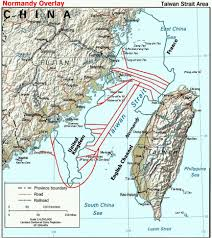War in the Taiwan Strait: Would China Invade Taiwan? 戰爭在台灣海峽:中國會入侵台灣?
Carrier-killer missiles, anti-ship weapons, amphibious assaults. Asia's greatest fear—and the possibility of a great power war over Taiwan's future—is all still very possible.
Beyond doubt, relations across the Taiwan Strait have improved substantially since 2008—so much so that some analysts have concluded that the course of the Taiwan “issue” will continue unimpeded and inexorably towards even greater stability, if not “reunification.” But this is all wishful thinking.
Rapprochement has probably gone as far as it can, and whatever comes next will likely be hounded by complications, slow progress and growing opposition in Taiwan. Unable or unwilling to make any proposal for unification that has any chance of appealing to democratic Taiwan’s 23 million people, wrong footed by the rise of Taiwan’s combative civil society, and haunted by recent developments in Hong Kong, where “one country, two systems” is all but dead, China will have two options: give up on Taiwan, or use force to complete the job. Under the decisive President Xi Jinping, in the context of rising ultranationalism across China, and given the cost of “losing” Taiwan to the Chinese Communist Party’s (CCP) credibility (at least according to Beijing’s rhetoric), it is difficult to imagine that Beijing would choose the former option. Use of force, therefore, would be the likely response, and hubristic China might well be tempted to try its luck.
在亞洲最大的恐懼,就是說台灣將來對付的一個大國戰爭的可能性,在未來是一切還是很有可能的。軍火商的殺手導彈,反艦武器,兩棲攻擊艦艇,大肆訪問台灣,進行銷售作業,這樣一來台灣勢必大幅度的採購以備未來戰爭之用?
毋庸置疑,自2008年以來兩岸關係已大幅改善,以至於一些分析師得出的結論是,台灣“問題”的過程將繼續暢通無阻,並無情地走向更大的穩定性,如果沒有改進的“統一”。
但是,這是所有的一廂情願。中國雖然強調”1個中國”,”九二共識”,恐怕是費盡九牛二虎之力,再也無法使台灣重回祖國的懷抱,因此最後的最佳選擇,依然是以武力攻擊台灣?
20160701台灣海軍以雄3飛彈誤射方式挑釁,中國的反應,一般而言台灣軍事是有所節制的,事件的發生時節點太敏感,也令人懷疑,西方戰略分析家認為:
1:20160701是中國共產黨建立95之週年紀念日.
2:台灣地區領導人過境美國訪問巴拿馬及巴拉圭.
3:台灣海軍並無公告實彈演習計劃,只是常態性的操作保養.為何失控導致事件發生?
4:台灣海軍被美國脅逼利誘配合演出.”誤射”雄3飛彈事件.根據情資透露出,美國早已計劃妥當,在台灣地區領導人去程過境美國邁阿密,回程過境美國洛杉磯之時,特別交代此一事件,絕對要執行,因為機會來臨不得不做.因為美國已等待16年喇,好不容易逮到機會,澈底利用台灣,因為你們台灣民進黨政府親美,哈日,給予他們製造整肅中國的大好機會.你們台灣的國安局
5:美國重返亞太戰略澈底失敗,美國無法圍堵中國南海,又無正當理由向中國宣戰,只能以雙航空母艦戰鬥群以演習為名,到中國南海耀武揚威一翻,這種小孩子的戲碼國際間誰都明白,再加上南海仲裁案即將公告,對於中國而言已是無效的無效,中國早已言明將不承認,也不接受海牙國際法庭的仲裁案.
6:美國帶頭搞亂國際間的和平局勢,再以世界員警角色扮演,執行所謂維護世界和平為幌子,到處煽風點火,造成戰爭情勢,此種國際關係,對於美國是有利益的不是嗎?
7:西方某大國際關係研究所資深研究員表示,此種低檔的戰略計劃與戰術行動,全世界大概只有美國牛仔可以玩弄中國與台灣,只有犧牲掉台灣,換取美國的利益就是利益,可憐無知的台灣海軍,就這樣子當作犧牲品犧牲掉.
8:誤射飛彈事件發生後至今,美國官方媒體網路等新聞,尚不見任何訊息報導,僅有紐約時報與CNN報導,台灣飛彈擊中自家漁船造成傷亡事件.
9:西方戰略家咸信美國當局正在應變謀求解套策略,72小時後就會發出聲明,表達錯愕與遺憾之意,並奉勸台灣海軍澈底檢討改進飛彈操作保護程序與標準作業,無關痛養的官方聲明稿,顯示出與我美國無關,一切都是台灣海軍誤射飛彈.
10:中國已聲明要求台灣解釋並負責任,海峽兩岸的熱線電話鈴聲始終未曾響起來?
和平解決台灣問題方式可能已經盡可能流失了,任何隨之而來的將可能的並發症,在台灣經濟成長的緩慢與蕭條是反向進行。你們台灣的領導人她無法或不願作出統一,民主的台灣2300萬人民,由台灣好鬥的公民社會的興起,左右開弓的任何機會提出任何建議,並通過最近的事態發展在香港,“一個國家,兩種制度”,中國將有兩個選擇:放棄對台灣,或使用武力來完成作業。
習近平在中國的崛起極端民族主義的背景下,並給予的“丟失”台灣的代價是中國共產黨的(CCP)公信力,這是很難想像北京會選擇前者選項。武力的使用,因此將來可能的反應,傲慢中國很可能會去嘗試的運氣。
本文作者企圖以理性與感性並容的方式,分析描述中國對於解決台灣問題的各種模擬假設,以及真實的應對政策,只可惜西方人並不完全瞭解中華文化的精深,也無法涉入海峽兩岸核心的議題,只如今台灣又政黨輪替,由傾向台灣獨立的民進黨,再度執政,這又給中國,台灣以及美國代來新的挑戰機會?
The widening power imbalance in the Taiwan Strait, added to (mistaken) perceptions that Taiwanese have no will to fight, has led some Chinese officials and many members of the People’s Liberation Army (PLA) to conclude that the military option, which Beijing never abandoned even as relations improved, is not only a viable one, but one that could quickly resolve the issue. Granted, the ratio of annual defense expenditures reached about 12:1 in China’s favor this year (and that is only using China’s declared budget).
Moreover, while the United States, Taiwan’s principal security partner, has been reluctant to provide offensive military technology to Taiwan (the Taiwan Relations Act of 1979 emphasizes the defensive nature of arms transfers to the island) and has abided by multilateral bodies, such as the Missile Technology Control Regime (MTCR), to regulate arms sales to Taipei, Beijing has relied on Russia to procure some of the most modern weapons in service, from air defense systems to advanced fighter-aircraft. When Moscow hesitated or dragged its feet in delivering the systems sought by Beijing, the PLA simply turned to Ukraine to obtain what it needed. As a result, the PLA today is a much more formidable opponent than it was just a decade ago, when facing a much less amenable partner in Taipei, the use of force must have been a more inviting, if not likely, alternative.
Despite the imbalance, invading Taiwan would not be a walk in the park. Relative weakness notwithstanding, the Taiwanese military fields a relatively modern force—F-16s, AH-64E attack helicopters, Kidd-class destroyers and so on—that could inflict a fair degree of damage to invading PLA forces. Furthermore, the fielding of offensive-defense platforms, such as the Hsiung Feng IIE land-attack cruise missile (LACM), the Hsiung Feng III supersonic antiship cruise missile and the Wan Chien—an air-to-ground, standoff, cruise missile
missile-type missile mounted on aircraft that can be used to disable airbases and radar sites in China—would increase the potential cost of Chinese military adventurism in the Taiwan Strait.Besides technology, Taiwan’s geography also poses a challenge to invading PLA forces. As Richard Bush and Michael O’Hanlon argue in their book A War Like No Other, the soil composition and inclination of Taiwan’s west coast facing China, where the Taiwanese military deploys most of its antiarmor capabilities, is even less conducive to a successful amphibious assault than were the beaches of Normandy, where Allied forces changed the course of World War II, at the cost of an estimated 10,000 casualties, including 2,500 dead.